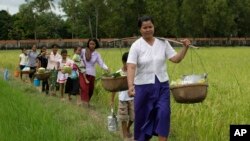Cambodian women have yet to receive equal support and the ability to fully participate in Cambodian society, experts say.
Seng Reasey, a rights worker at local NGO Silaka, said some women have to choose between having a career and having a family.
“Sometimes they also want to develop themselves but the social norm forces them to give up,” she said, “People don’t think that sharing household chores is the mutual responsibility of men and women.”
She added that women could effectively balance work and family life so long as they received support in the home from their family and society.
“Every women has her own talent. It’s a waste if we just place them at home to do housework.”
Ros Sopheap, director of Gender and Development for Cambodia, said women should not be told what they can can and can’t do and deserve more support and independence.
“For example, if women decides to go to work, their partner should help her in doing some household work, not just let her alone do it.”
Just like other working women, Sopheap has to deal with housework after office hours, but she is lucky to receive help from her husband
“He has never stopped me from doing what I want to do. He supported me to get involved in social work,” she added, “He knows that working women understand the outside world, so I am able to better educate my children.”
Sopheap said the number of working women is increasing, but the women in decision-making positions remains low.
Mu Sochua, deputy president of the opposition Cambodia National Rescue Party, said motherhood naturally took its toll on a woman’s professional aspirations.
“But if we allow them [women] to work equally on the same work, women could even perform better than men,” she said.
Sarah Knibbs, deputy representative of U.N. Women in Cambodia, said the choice between a career or a family was a false one.
“They should be able to exercise their right to choose, without being judged by others for their choices.”
“It is very important to value women’s work as careers. Without care work – cooking, cleaning and caring for children and elderly people – our families and societies can not function, but this work is unpaid, undervalued and is missing from economic analysis,” she added.




